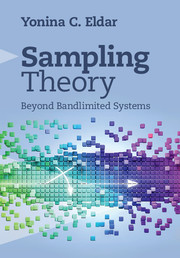Book contents
- Frontmatter
- Dedication
- Contents
- Preface
- 1 Introduction
- 2 Introduction to linear algebra
- 3 Fourier analysis
- 4 Signal spaces
- 5 Shift-invariant spaces
- 6 Subspace priors
- 7 Smoothness priors
- 8 Nonlinear sampling
- 9 Resampling
- 10 Union of subspaces
- 11 Compressed sensing
- 12 Sampling over finite unions
- 13 Sampling over shift-invariant unions
- 14 Multiband sampling
- 15 Finite rate of innovation sampling
- Appendix A Finite linear algebra
- Appendix B Stochastic signals
- References
- Index
1 - Introduction
Published online by Cambridge University Press: 05 August 2014
- Frontmatter
- Dedication
- Contents
- Preface
- 1 Introduction
- 2 Introduction to linear algebra
- 3 Fourier analysis
- 4 Signal spaces
- 5 Shift-invariant spaces
- 6 Subspace priors
- 7 Smoothness priors
- 8 Nonlinear sampling
- 9 Resampling
- 10 Union of subspaces
- 11 Compressed sensing
- 12 Sampling over finite unions
- 13 Sampling over shift-invariant unions
- 14 Multiband sampling
- 15 Finite rate of innovation sampling
- Appendix A Finite linear algebra
- Appendix B Stochastic signals
- References
- Index
Summary
We live in an analog world, but we would like our digital computers to interact with it. Indeed, digital signal processing (DSP) has become pervasive. It is the basis for most modern consumer electronics, medical imaging devices, cell phones, internet protocol telephony, multimedia standards, speech processing, and a myriad of other products. Digital algorithms, implemented with microprocessors, are less pricey, easier to control, more robust, and more flexible than their analog counterparts, so that nowadays analog circuits are often replaced by digital chips. Digital data is also far easier to store, transmit, and manipulate than analog data. Therefore, in modern applications, an increasing number of functions are being pushed forward to sophisticated software algorithms, leaving only delicate finely tuned tasks for the circuit level. Nowadays, it feels natural that a media player shows our favorite movie, or that our surround system synthesizes pure acoustics, as if sitting in the orchestra, and not in the living room. The digital world plays a fundamental role in our everyday routine, to such a point that we almost forget that we cannot “hear” or “watch” these streams of bits, running behind the scenes. The world around us is analog, yet most modern man-made means for exchanging information are digital. “I am an analog girl in a digital world,” sings Judy Gorman [One Sky, 1998], capturing the essence of the digital revolution.
- Type
- Chapter
- Information
- Sampling TheoryBeyond Bandlimited Systems, pp. 1 - 8Publisher: Cambridge University PressPrint publication year: 2015



